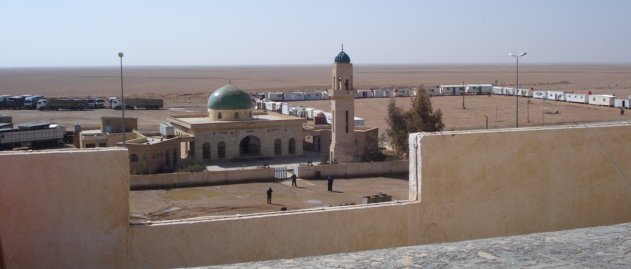
I always thought it was a joke. Iraqi men would ask me if I was married. When I said, “yes”, they would ask me how many wives. We both laughed a little. Then a couple of weeks ago, I thought I would play along with the joke and when they told me that they were married, I asked the same question about wives. To my surprise, it had been a serious question and almost everybody has more than one. It should not have come as a surprise. This is a Muslim country and the men I meet are usually well off and so are the kinds of guys who can afford larger families, but somehow it never really occurred to me.
Some of these guys are very active. One old toothless sheik has a very young son from a very young new wife. While I suspect it is possible that there might be more men on the job, nobody is particularly surprised by this. A local mayor mentioned in passing that he had three wives and fourteen kids. He also said, perfunctorily, that he was getting married next week. When I pressed him on the fact that he didn’t seem that excited, he explained that he was just marrying his sister in law. His brother had died and somebody had to take care of her. He got the job to keep it all in the family.
The extended family is one of the pillars of the polygamy. We tend to project the system into the American context of a nuclear family just with a couple additional women. That is not really how it works here. It is more of a welfare system married (literally) to a system of tribal or dynastic alliances. Tribal affiliation is the key to success for individuals. You can be born into a tribe or you can marry into a tribe and if you are particularly clever you can marry into up to four tribes. This both complicates and simplifies genealogy because after a few generations there are lots of overlaps, so you have fewer family lines but a lot more permutations among them.
If you assume that there is rough gender parity for 18-25 year-olds, polygamy means that if some guys get two or three wives, others don’t get any at all, or at least they have to pick up the older women from the age groups where women come to outnumber men. I suppose in a culture where a lot of men died in warfare, such a system works out well. I recall reading about the Blackfoot Indians of Montana. They were a particularly warlike people and sometimes as many as 2/3 of the male population was killed in the low-level but perpetual warfare they favored. No matter. The remaining men did triple duty and each generation was as big as the one previous.
I don’t think this is the way it is working in Iraq. It is just the traditional Muslim practice and seems fairly routine & uncontroversial at least among the men of western Al Anbar.
